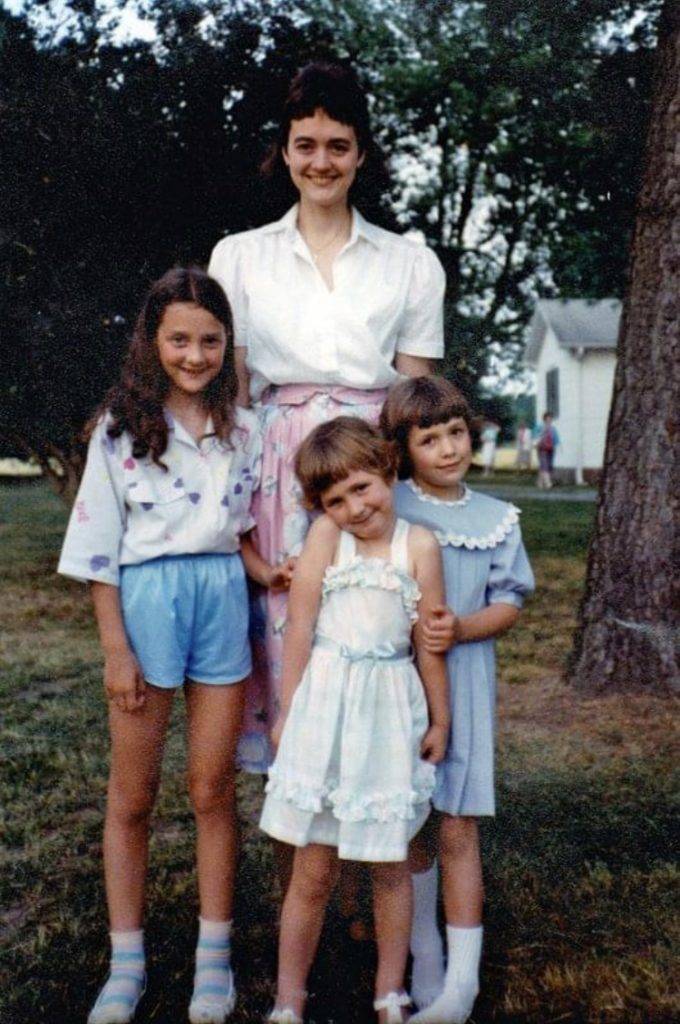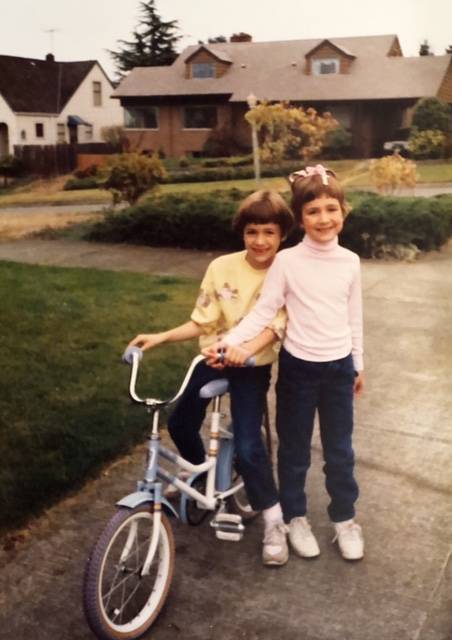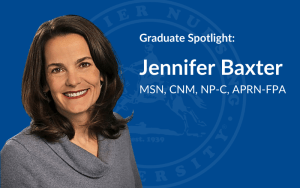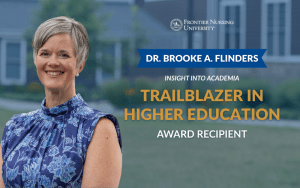The last time sisters Emily Hagy and Teresa Vlahovich were in the same class was more than 20 years ago when they were in high school.
“The last time we took a class together it was geometry. She was a high school freshman and I was a junior,” said Teresa, who is 20 months older than Emily. “I am pretty certain that Emily got an A and I had dropped out by October. As kids, Emily was much more studious than me.”
Teresa’s modesty aside, both sisters have gone on to successful careers, taking vastly different routes to the same destination as they are both currently enrolled in Class 198 of Frontier Nursing University’s Psychiatric-Mental Health Nurse Practitioner (PMHNP) program. When they took their first PMHNP course together in October, it was the first time they were classmates since high school.

Emily Hagy (center) with older sister Laura Vlahovich (left) and Teresa Vlahovich (right), and their mother Paula Clark.
The sisters, who are the middle two out of four children, grew up in Tacoma, Washington. Their father was a nationally known wooden boat builder and his work took them to the east coast periodically. Now, most of the family, including Teresa and Emily, lives in Maryland. Their older sister is a graphic designer and their younger brother fishes salmon in Alaska.
Despite the close proximity — Teresa and Emily live about two hours apart — their careers have vastly differed until now. They were both inspired to some degree by their parents, with Teresa being drawn to their mother’s career as a nurse. Teresa, MSN, CNM, graduated from FNU’s CNEP program in 2013 (Class 78), after earning her BSN from the University of Maryland, Baltimore, and has worked for most of her career in the federally qualified health center (FQHC) setting.
“I did not grow up thinking that I wanted to go into psych/mental health,” said Teresa, who now lives in Baltimore, Maryland. “I was drawn to pregnancy and childbirth early on. However, my mother’s nursing career did plant a seed. She worked most of her career in an outpatient day program at the VA hospital. The program primarily served Vietnam veterans with schizophrenia. She would bring us to work for holidays and I have fond memories of cooking Thanksgiving dinner for the guys and helping with games and gifts. I still remember how touched I was by the supportive way that the patients related to one another in the group setting. I had never seen men relate that way before. My mother had years-long relationships with many of these men who had experienced serious trauma as young men in war and were subsequently living on the margins of society. It was clear to me that the relationship she had built with these men was a part of what kept them engaged in care. I know now that what I was witnessing was the therapeutic relationship in action, and throughout my own career, I have come to value just how significant that relationship is to both client and clinician. With the rising number of mental health conditions and a nationwide substance use disorder crisis, I wanted additional training to better serve my current patient population.”
While a health care profession always appealed to Teresa, little sister Emily was inspired more by her father’s line of work and she graduated with bachelor’s degrees in marine biology and invertebrate zoology and a master’s degree in marine ecology.
“I worked with oysters for approximately ten years, conducting research and restoration in the Chesapeake Bay,” said Emily, who lives in Cambridge, Maryland. “People think that jumping from oysters to people is strange, but I view the careers as similar. Caring for non-human animals is not that different from caring for humans. The skills and knowledge are different, but both are service-oriented and fulfill my desire to use my heart at work.”
Emily, too, remembers her mother’s work at the VA and enjoyed volunteering there.
“I have vivid memories of interacting with the participants,” Emily said. “This was a unique experience for a teen, and I’m sure it piqued some interest in me.”
While that interest took a back seat to marine biology for a period of time, it resurfaced recently when she was working as a nurse at a FQHC.
“I saw the extreme shortage of mental health care available in our area,” said Emily, who earned her Bachelor of Science in Nursing (BSN) from Salisbury University. “I knew our patients well, and it was disheartening that there was simply so little we could do for them, considering the shortages. That was what I needed to push me into pursuing a PMHNP.”
Though they both had a similar interest in psychiatric-mental health, the sisters were both quite busy with their established careers and lives. Emily and her husband William have a son who was born in April 2020. Teresa and her wife Crimson have four children — a 14-year-old son, an 8-year-old daughter, and twin four-year-olds (one boy, one girl).
Despite their busy schedules, they are both high achievers driven to serve. Separately, they have each noticed the shortage of mental health providers in their respective communities, and, jointly, they decided to do their part to address the issue.

Teresa Vlahovich (left) and Emily Hagy
“In my community, access to care is the biggest concern,” Emily said. “Working through the stigma of mental health care doesn’t matter if there are no providers to see the clients.”
As their interest in psychiatric-mental health piqued, Teresa leaned on her previous experience at Frontier to guide their joint decision.
“When investigating nurse-midwifery programs, I was initially drawn to Frontier for the community health focus. I had a great experience at Frontier obtaining my midwifery education and honestly did not consider looking anywhere else for the psych-mental health program,” Teresa said. “I used my influence as an older sister to influence my sister to join me.”
“Teresa has been singing the praises of FNU for some time,” Emily said. “Also, I’ve had several providers who are Frontier graduates, and they had nothing but good things to say. I wanted an online program, and I was most comfortable choosing one with a long successful history.”
One of FNU’s areas of focus is helping to reduce healthcare disparities. While Emily and Teresa recognize that they alone will not fill the significant voids, they are eager to play a role in the overall care of their communities. They have even considered opening a practice together someday.
“One person doesn’t solve the problem, but it is significant for the people we can serve,” said Emily, who hopes to work with patients of all ages, with a focus on children and adolescents. “In mental health, treatment for one client can make a world of difference for that client, but also for their children, siblings, parents, friends, and community.”
Teresa intends to continue to work as a nurse-midwife in addition to starting a psychiatric-mental health practice.
“I hope to start a part-time mental health practice with a focus on mental and emotional health needs during pregnancy and postpartum,” she said.
Even as they consider what lies ahead, Emily and Teresa are enjoying their journey together.
“It is a great motivator to have my sister in the program with me and I doubt that I would have taken on a post-graduate certificate program without her partnership,” Teresa said.
Thank you, Emily and Teresa, for answering the call to become nurse practitioners who provide primary care in underserved communities!
To learn more about our Psychiatric-Mental Health Nurse Practitioner program or our Certified Nurse-Midwifery program, visit our website.






















 Carrie Belin is an experienced board-certified Family Nurse Practitioner and a graduate of the Johns Hopkins DNP program, Johns Hopkins Bloomberg School of Public Health, Georgetown University School of Nursing, and Johns Hopkins School of Nursing. She has also completed fellowships at Georgetown and the University of California Irvine.
Carrie Belin is an experienced board-certified Family Nurse Practitioner and a graduate of the Johns Hopkins DNP program, Johns Hopkins Bloomberg School of Public Health, Georgetown University School of Nursing, and Johns Hopkins School of Nursing. She has also completed fellowships at Georgetown and the University of California Irvine. Angie has been a full-scope midwife since 2009. She has experience in various birth settings including home, hospital, and birth centers. She is committed to integrating the midwifery model of care in the US. She completed her master’s degree in nurse-midwifery at Frontier Nursing University (FNU) and her Doctorate at Johns Hopkins University. She currently serves as the midwifery clinical faculty at FNU. Angie is motivated by the desire to improve the quality of healthcare and has led quality improvement projects on skin-to-skin implementation, labor induction, and improving transfer of care practices between hospital and community midwives. In 2017, she created a short film on skin-to-skin called
Angie has been a full-scope midwife since 2009. She has experience in various birth settings including home, hospital, and birth centers. She is committed to integrating the midwifery model of care in the US. She completed her master’s degree in nurse-midwifery at Frontier Nursing University (FNU) and her Doctorate at Johns Hopkins University. She currently serves as the midwifery clinical faculty at FNU. Angie is motivated by the desire to improve the quality of healthcare and has led quality improvement projects on skin-to-skin implementation, labor induction, and improving transfer of care practices between hospital and community midwives. In 2017, she created a short film on skin-to-skin called 










 Justin C. Daily, BSN, RN, has ten years of experience in nursing. At the start of his nursing career, Justin worked as a floor nurse on the oncology floor at St. Francis. He then spent two years as the Director of Nursing in a small rural Kansas hospital before returning to St. Francis and the oncology unit. He has been in his current position as the Chemo Nurse Educator for the past four years. He earned an Associate in Nurse from Hutchinson Community College and a Bachelor of Science in Nursing from Bethel College.
Justin C. Daily, BSN, RN, has ten years of experience in nursing. At the start of his nursing career, Justin worked as a floor nurse on the oncology floor at St. Francis. He then spent two years as the Director of Nursing in a small rural Kansas hospital before returning to St. Francis and the oncology unit. He has been in his current position as the Chemo Nurse Educator for the past four years. He earned an Associate in Nurse from Hutchinson Community College and a Bachelor of Science in Nursing from Bethel College. Brandy Jackson serves as the Director of Undergraduate Nursing Programs and Assistant Educator at Wichita State University and Co-Director of Access in Nursing. Brandy is a seasoned educator with over 15 years of experience. Before entering academia, Brandy served in Hospital-based leadership and Critical Care Staff nurse roles. Brandy is passionate about equity in nursing education with a focus on individuals with disabilities. Her current research interests include accommodations of nursing students with disabilities in clinical learning environments and breaking down barriers for historically unrepresented individuals to enter the nursing profession. Brandy is also actively engaged in Interprofessional Education development, creating IPE opportunities for faculty and students at Wichita State. Brandy is an active member of Wichita Women for Good and Soroptimist, with the goal to empower women and girls. Brandy is a TeamSTEPPS master trainer. She received the DASIY Award for Extraordinary Nursing Faculty in 2019 at Wichita State University.
Brandy Jackson serves as the Director of Undergraduate Nursing Programs and Assistant Educator at Wichita State University and Co-Director of Access in Nursing. Brandy is a seasoned educator with over 15 years of experience. Before entering academia, Brandy served in Hospital-based leadership and Critical Care Staff nurse roles. Brandy is passionate about equity in nursing education with a focus on individuals with disabilities. Her current research interests include accommodations of nursing students with disabilities in clinical learning environments and breaking down barriers for historically unrepresented individuals to enter the nursing profession. Brandy is also actively engaged in Interprofessional Education development, creating IPE opportunities for faculty and students at Wichita State. Brandy is an active member of Wichita Women for Good and Soroptimist, with the goal to empower women and girls. Brandy is a TeamSTEPPS master trainer. She received the DASIY Award for Extraordinary Nursing Faculty in 2019 at Wichita State University.  Dr. Sabrina Ali Jamal-Eddine is an Arab-disabled queer woman of color with a PhD in Nursing and an interdisciplinary certificate in Disability Ethics from the University of Illinois Chicago (UIC). Dr. Jamal-Eddine’s doctoral research explored spoken word poetry as a form of critical narrative pedagogy to educate nursing students about disability, ableism, and disability justice. Dr. Jamal-Eddine now serves as a Postdoctoral Research Associate in UIC’s Department of Disability and Human Development and serves on the Board of Directors of the National Organization of Nurses with Disabilities (NOND). During her doctoral program, Sabrina served as a Summer Fellow at a residential National Endowment of the Humanities (NEH) Summer Institute at Arizona State University (2023), a summer fellow at Andrew W. Mellon’s National Humanities Without Walls program at University of Michigan (2022), a Summer Research Fellow at UC Berkeley’s Othering & Belonging Institute (2021), and an Illinois Leadership Education in Neurodevelopmental and related Disabilities (LEND) trainee (2019-2020).
Dr. Sabrina Ali Jamal-Eddine is an Arab-disabled queer woman of color with a PhD in Nursing and an interdisciplinary certificate in Disability Ethics from the University of Illinois Chicago (UIC). Dr. Jamal-Eddine’s doctoral research explored spoken word poetry as a form of critical narrative pedagogy to educate nursing students about disability, ableism, and disability justice. Dr. Jamal-Eddine now serves as a Postdoctoral Research Associate in UIC’s Department of Disability and Human Development and serves on the Board of Directors of the National Organization of Nurses with Disabilities (NOND). During her doctoral program, Sabrina served as a Summer Fellow at a residential National Endowment of the Humanities (NEH) Summer Institute at Arizona State University (2023), a summer fellow at Andrew W. Mellon’s National Humanities Without Walls program at University of Michigan (2022), a Summer Research Fellow at UC Berkeley’s Othering & Belonging Institute (2021), and an Illinois Leadership Education in Neurodevelopmental and related Disabilities (LEND) trainee (2019-2020). Vanessa Cameron works for Vanderbilt University Medical Center in Nursing Education & Professional Development. She is also attending George Washington University and progressing towards a PhD in Nursing with an emphasis on ableism in nursing. After becoming disabled in April 2021, Vanessa’s worldview and perspective changed, and a recognition of the ableism present within healthcare and within the culture of nursing was apparent. She has been working since that time to provide educational foundations for nurses about disability and ableism, provide support for fellow disabled nursing colleagues, and advocate for the disabled community within healthcare settings to reduce disparities.
Vanessa Cameron works for Vanderbilt University Medical Center in Nursing Education & Professional Development. She is also attending George Washington University and progressing towards a PhD in Nursing with an emphasis on ableism in nursing. After becoming disabled in April 2021, Vanessa’s worldview and perspective changed, and a recognition of the ableism present within healthcare and within the culture of nursing was apparent. She has been working since that time to provide educational foundations for nurses about disability and ableism, provide support for fellow disabled nursing colleagues, and advocate for the disabled community within healthcare settings to reduce disparities. Dr. Lucinda Canty is a certified nurse-midwife, Associate Professor of Nursing, and Director of the Seedworks Health Equity in Nursing Program at the University of Massachusetts Amherst. She earned a bachelor’s degree in nursing from Columbia University, a master’s degree from Yale University, specializing in nurse-midwifery, and a PhD from the University of Connecticut. Dr. Canty has provided reproductive health care for over 29 years. Her research interests include the prevention of maternal mortality and severe maternal morbidity, reducing racial and ethnic health disparities in reproductive health, promoting diversity in nursing, and eliminating racism in nursing and midwifery.
Dr. Lucinda Canty is a certified nurse-midwife, Associate Professor of Nursing, and Director of the Seedworks Health Equity in Nursing Program at the University of Massachusetts Amherst. She earned a bachelor’s degree in nursing from Columbia University, a master’s degree from Yale University, specializing in nurse-midwifery, and a PhD from the University of Connecticut. Dr. Canty has provided reproductive health care for over 29 years. Her research interests include the prevention of maternal mortality and severe maternal morbidity, reducing racial and ethnic health disparities in reproductive health, promoting diversity in nursing, and eliminating racism in nursing and midwifery. Dr. Lisa Meeks is a distinguished scholar and leader whose unwavering commitment to inclusivity and excellence has significantly influenced the landscape of health professions education and accessibility. She is the founder and executive director of the DocsWithDisabilities Initiative and holds appointments as an Associate Professor in the Departments of Learning Health Sciences and Family Medicine at the University of Michigan.
Dr. Lisa Meeks is a distinguished scholar and leader whose unwavering commitment to inclusivity and excellence has significantly influenced the landscape of health professions education and accessibility. She is the founder and executive director of the DocsWithDisabilities Initiative and holds appointments as an Associate Professor in the Departments of Learning Health Sciences and Family Medicine at the University of Michigan. Dr. Nikia Grayson, DNP, MSN, MPH, MA, CNM, FNP-C, FACNM (she/her) is a trailblazing force in reproductive justice, blending her expertise as a public health activist, anthropologist, and family nurse-midwife to champion the rights and health of underserved communities. Graduating with distinction from Howard University, Nikia holds a bachelor’s degree in communications and a master’s degree in public health. Her academic journey also led her to the University of Memphis, where she earned a master’s in medical anthropology, and the University of Tennessee, where she achieved both a master’s in nursing and a doctorate in nursing practice. Complementing her extensive education, she completed a post-master’s certificate in midwifery at Frontier Nursing University.
Dr. Nikia Grayson, DNP, MSN, MPH, MA, CNM, FNP-C, FACNM (she/her) is a trailblazing force in reproductive justice, blending her expertise as a public health activist, anthropologist, and family nurse-midwife to champion the rights and health of underserved communities. Graduating with distinction from Howard University, Nikia holds a bachelor’s degree in communications and a master’s degree in public health. Her academic journey also led her to the University of Memphis, where she earned a master’s in medical anthropology, and the University of Tennessee, where she achieved both a master’s in nursing and a doctorate in nursing practice. Complementing her extensive education, she completed a post-master’s certificate in midwifery at Frontier Nursing University.









 Dr. Tia Brown McNair is the Vice President in the Office of Diversity, Equity, and Student Success and Executive Director for the Truth, Racial Healing, and Transformation (TRHT) Campus Centers at the American Association of Colleges and Universities (AAC&U) in Washington, DC. She oversees both funded projects and AAC&U’s continuing programs on equity, inclusive excellence, high-impact practices, and student success. McNair directs AAC&U’s Summer Institutes on High-Impact Practices and Student Success, and TRHT Campus Centers and serves as the project director for several AAC&U initiatives, including the development of a TRHT-focused campus climate toolkit. She is the lead author of From Equity Talk to Equity Walk: Expanding Practitioner Knowledge for Racial Justice in Higher Education (January 2020) and Becoming a Student-Ready College: A New Culture of Leadership for Student Success (July 2016 and August 2022 Second edition).
Dr. Tia Brown McNair is the Vice President in the Office of Diversity, Equity, and Student Success and Executive Director for the Truth, Racial Healing, and Transformation (TRHT) Campus Centers at the American Association of Colleges and Universities (AAC&U) in Washington, DC. She oversees both funded projects and AAC&U’s continuing programs on equity, inclusive excellence, high-impact practices, and student success. McNair directs AAC&U’s Summer Institutes on High-Impact Practices and Student Success, and TRHT Campus Centers and serves as the project director for several AAC&U initiatives, including the development of a TRHT-focused campus climate toolkit. She is the lead author of From Equity Talk to Equity Walk: Expanding Practitioner Knowledge for Racial Justice in Higher Education (January 2020) and Becoming a Student-Ready College: A New Culture of Leadership for Student Success (July 2016 and August 2022 Second edition).